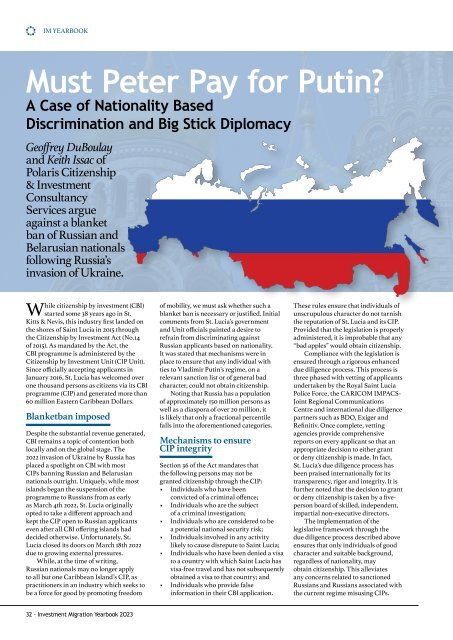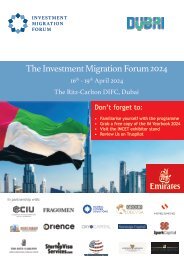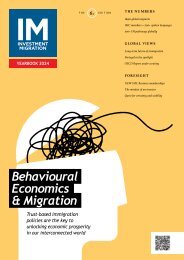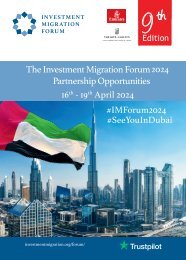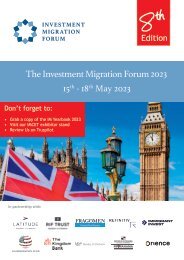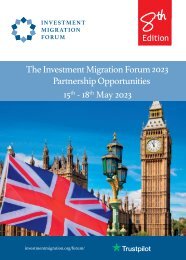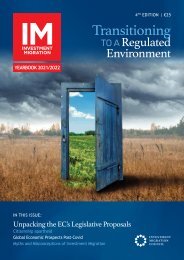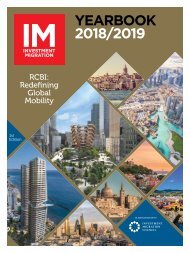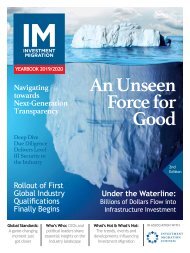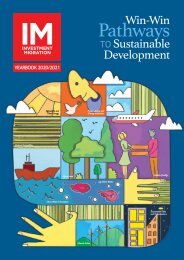IM Yearbook 2023
The completely new IM Yearbook 2023 is the 5th edition of what is now known as the most anticipated guide of the Investment Migration industry. The IM Yearbook is the essential global reference tool for the industry by the industry. Offering unrivaled valuable access to a prime targeted readership of your partners, clients and potential new business сontacts. Decision-makers in more than 54 countries trust the publication as a reputable source of information and guide. Readership includes: agents, law firms, advisory firms, banks, wealth managers, service providers, policy makers, government staffers, international organisations, and academics. Providing comprehensive, in-depth information about the global Investment Migration industry, the IM Yearbook 2023 will offer readers a practical A-Z guide to the current business operating environment while also highlighting the depth and breadth of practitioners, programmes, and their partners of all types.
The completely new IM Yearbook 2023 is the 5th edition of what is now known as the most anticipated guide of the Investment Migration industry.
The IM Yearbook is the essential global reference tool for the industry by the industry. Offering unrivaled valuable access to a prime targeted readership of your partners, clients and potential new business сontacts. Decision-makers in more than 54 countries trust the publication as a reputable source of information and guide. Readership includes: agents, law firms, advisory firms, banks, wealth managers, service providers, policy makers, government staffers, international organisations, and academics.
Providing comprehensive, in-depth information about the global Investment Migration industry, the IM Yearbook 2023 will offer readers a practical A-Z guide to the current business operating environment while also highlighting the depth and breadth of practitioners, programmes, and their partners of all types.
Create successful ePaper yourself
Turn your PDF publications into a flip-book with our unique Google optimized e-Paper software.
<strong>IM</strong> YEARBOOK<br />
Must Peter Pay for Putin?<br />
A Case of Nationality Based<br />
Discrimination and Big Stick Diplomacy<br />
Geoffrey DuBoulay<br />
and Keith Issac of<br />
Polaris Citizenship<br />
& Investment<br />
Consultancy<br />
Services argue<br />
against a blanket<br />
ban of Russian and<br />
Belarusian nationals<br />
following Russia’s<br />
invasion of Ukraine.<br />
While citizenship by investment (CBI)<br />
started some 38 years ago in St.<br />
Kitts & Nevis, this industry first landed on<br />
the shores of Saint Lucia in 2015 through<br />
the Citizenship by Investment Act (No.14<br />
of 2015). As mandated by the Act, the<br />
CBI programme is administered by the<br />
Citizenship by Investment Unit (CIP Unit).<br />
Since officially accepting applicants in<br />
January 2016, St. Lucia has welcomed over<br />
one thousand persons as citizens via its CBI<br />
programme (CIP) and generated more than<br />
60 million Eastern Caribbean Dollars.<br />
Blanketban imposed<br />
Despite the substantial revenue generated,<br />
CBI remains a topic of contention both<br />
locally and on the global stage. The<br />
2022 invasion of Ukraine by Russia has<br />
placed a spotlight on CBI with most<br />
CIPs banning Russian and Belarusian<br />
nationals outright. Uniquely, while most<br />
islands began the suspension of the<br />
programme to Russians from as early<br />
as March 4th 2022, St. Lucia originally<br />
opted to take a different approach and<br />
kept the CIP open to Russian applicants<br />
even after all CBI offering islands had<br />
decided otherwise. Unfortunately, St.<br />
Lucia closed its doors on March 18th 2022<br />
due to growing external pressures.<br />
While, at the time of writing,<br />
Russian nationals may no longer apply<br />
to all but one Caribbean Island’s CIP, as<br />
practitioners in an industry which seeks to<br />
be a force for good by promoting freedom<br />
of mobility, we must ask whether such a<br />
blanket ban is necessary or justified. Initial<br />
comments from St. Lucia’s government<br />
and Unit officials painted a desire to<br />
refrain from discriminating against<br />
Russian applicants based on nationality.<br />
It was stated that mechanisms were in<br />
place to ensure that any individual with<br />
ties to Vladimir Putin’s regime, on a<br />
relevant sanction list or of general bad<br />
character, could not obtain citizenship.<br />
Noting that Russia has a population<br />
of approximately 150 million persons as<br />
well as a diaspora of over 20 million, it<br />
is likely that only a fractional percentile<br />
falls into the aforementioned categories.<br />
Mechanisms to ensure<br />
CIP integrity<br />
Section 36 of the Act mandates that<br />
the following persons may not be<br />
granted citizenship through the CIP:<br />
• Individuals who have been<br />
convicted of a criminal offence;<br />
• Individuals who are the subject<br />
of a criminal investigation;<br />
• Individuals who are considered to be<br />
a potential national security risk;<br />
• Individuals involved in any activity<br />
likely to cause disrepute to Saint Lucia;<br />
• Individuals who have been denied a visa<br />
to a country with which Saint Lucia has<br />
visa-free travel and has not subsequently<br />
obtained a visa to that country; and<br />
• Individuals who provide false<br />
information in their CBI application.<br />
These rules ensure that individuals of<br />
unscrupulous character do not tarnish<br />
the reputation of St. Lucia and its CIP.<br />
Provided that the legislation is properly<br />
administered, it is improbable that any<br />
“bad apples” would obtain citizenship.<br />
Compliance with the legislation is<br />
ensured through a rigorous enhanced<br />
due diligence process. This process is<br />
three phased with vetting of applicants<br />
undertaken by the Royal Saint Lucia<br />
Police Force, the CARICOM <strong>IM</strong>PACS-<br />
Joint Regional Communications<br />
Centre and international due diligence<br />
partners such as BDO, Exiger and<br />
Refinitiv. Once complete, vetting<br />
agencies provide comprehensive<br />
reports on every applicant so that an<br />
appropriate decision to either grant<br />
or deny citizenship is made. In fact,<br />
St. Lucia’s due diligence process has<br />
been praised internationally for its<br />
transparency, rigor and integrity. It is<br />
further noted that the decision to grant<br />
or deny citizenship is taken by a fiveperson<br />
board of skilled, independent,<br />
impartial non-executive directors.<br />
The implementation of the<br />
legislative framework through the<br />
due diligence process described above<br />
ensures that only individuals of good<br />
character and suitable background,<br />
regardless of nationality, may<br />
obtain citizenship. This alleviates<br />
any concerns related to sanctioned<br />
Russians and Russians associated with<br />
the current regime misusing CIPs.<br />
32 - Investment Migration <strong>Yearbook</strong> 2O23


